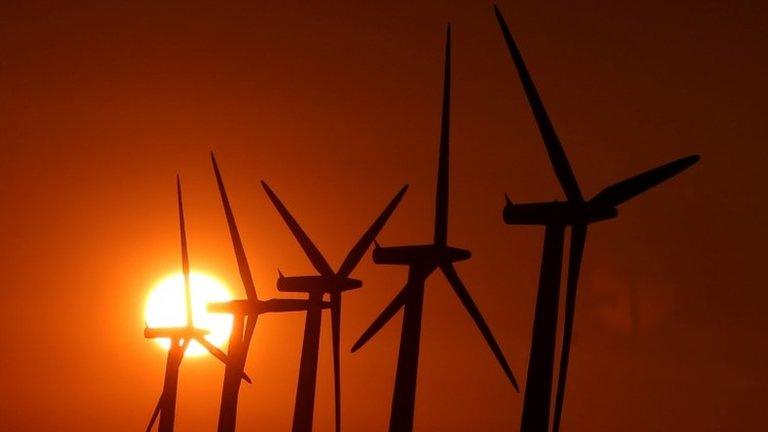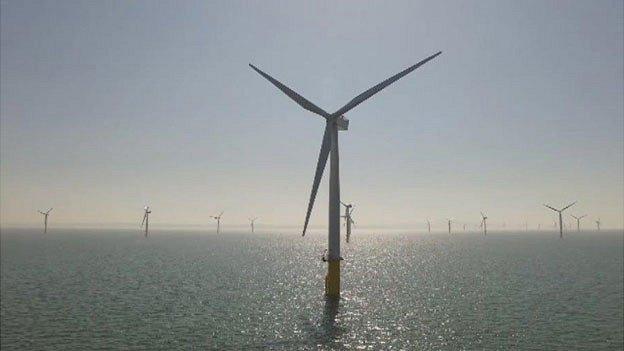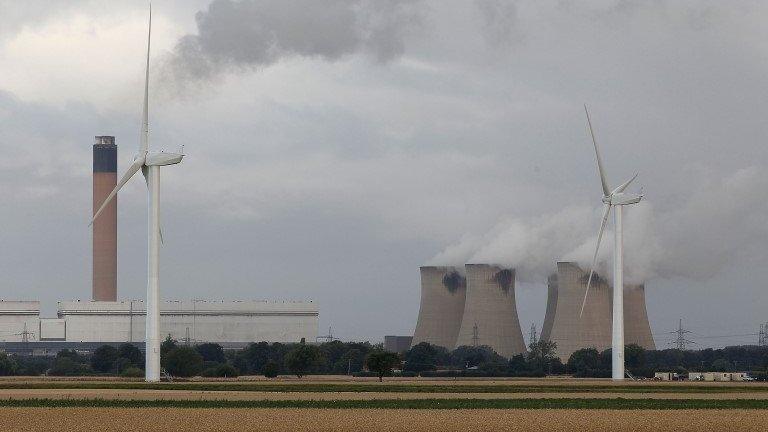Earlier end to subsidies for new UK onshore wind farms
- Published
- comments
Around 70% of onshore wind projects in the UK planning system are in Scotland, as Laura Bicker reports
New onshore wind farms will be excluded from a subsidy scheme from 1 April 2016, a year earlier than expected.
There will be a grace period for projects which already have planning permission, the Department of Energy and Climate Change said.
Energy firms had been facing an end to subsidies in 2017.
The funding for the subsidy comes from the Renewables Obligation, which is funded by levies added to household fuel bills.
After the announcement was made, Fergus Ewing, Scottish minister for business, energy and tourism and member of the Scottish parliament, said he had warned the UK government that the decision could be the subject of a judicial review.

Analysis: Roger Harrabin, environment analyst
The Conservatives promised in their manifesto to hold down bills and increase renewable energy.
But onshore wind is the cheapest readily-available form of clean energy in the UK. That's why some experts have described their decision to kill the onshore wind programme as bizarre and irrational.
Speaking to business leaders in London last night, Amber Rudd said it was time to shift subsidies from onshore wind to other technologies that needed them more. But she did not say what those technologies would be, and the government has not announced compensatory subsidies for other forms of energy.
Some of the business leaders are baffled why ministers will give local people a unique veto over wind turbines, when they cannot veto shale gas fracking or even a nuclear power station on their doorstep.
The government's policies are seen by green groups as nakedly political. Another reason may be partly at play - the right-leaning think tank Policy Exchange calculates, external that the energy subsidies programme has simply run out of cash.
If this is accurate, it presents a formidable challenge to an energy secretary who says she is committed to transforming the UK into a low-carbon economy.

"The decision by the UK government to end the Renewables Obligation next year is deeply regrettable and will have a disproportionate impact on Scotland, as around 70% of onshore wind projects in the UK planning system are here," he added.
'Energy mix'
The move was part of a manifesto commitment by the Conservative party ahead of the general election in May.
"We are driving forward our commitment to end new onshore wind subsidies and give local communities the final say over any new wind farms," said Energy and Climate Change Secretary Amber Rudd.
"Onshore wind is an important part of our energy mix and we now have enough subsidised projects in the pipeline to meet our renewable energy commitments," she said.
5,061
onshore turbines in the UK
-
18,000 gigawatt hours of electrcity generated by onshore turbines in 2014
-
5.5 million homes could run for a year on that power
-
5.6% of the UK total electricity needs
The Conservatives also say that the onshore turbines "often fail to win public support and are unable by themselves to provide the firm capacity that a stable energy system requires".
Some reports estimate that almost 3,000 wind turbines are awaiting planning permission and this announcement could jeopardise those plans.
Friends of the Earth's renewable energy campaigner Alasdair Cameron said: "While the government rolls out the red carpet for fracking, they're pulling the rug out from under onshore wind.
"Proposed changes to the planning system could make it more difficult for local authorities to give the go-ahead to new wind installations - even if it's the local community who want to build and run them."
And Gordon MacDougall, managing director of Renewable Energy Systems, a Sir Robert McAlpine Group company, told the BBC that "what we are seeing is political intervention".
He criticised the intervention in what he says is the cheapest form of low-carbon energy.
The grace period could allow up to 5.2 gigawatts (GW) of wind capacity to go ahead, which could mean hundreds more wind turbines going up across the UK.
- Published18 June 2015

- Published18 June 2015

- Published24 April 2014
